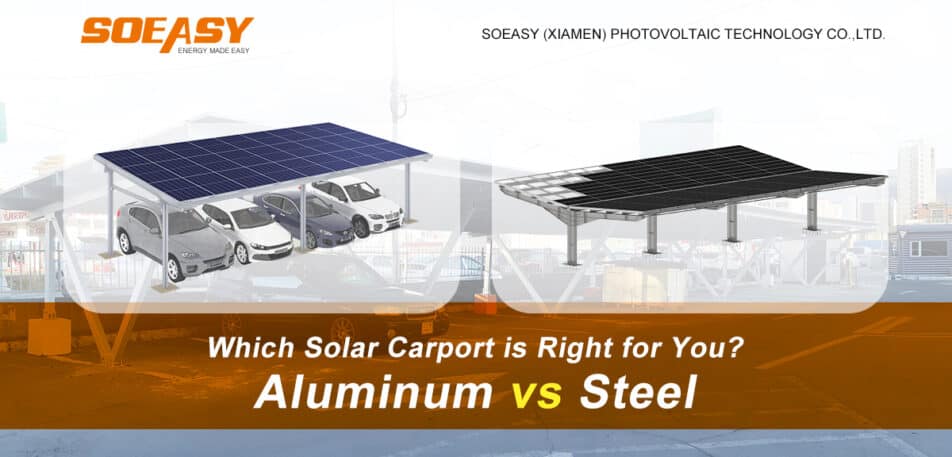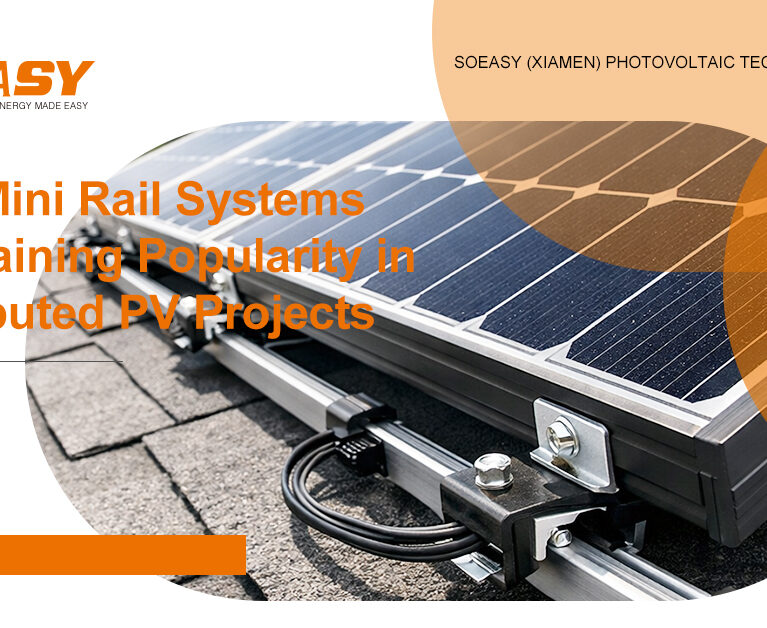Have you ever wondered if a parking lot could serve more than just storing vehicles? A solar carport transforms ordinary parking spaces into clean energy power stations, reshaping the way we utilize land. As an integrated form of green infrastructure, solar carports not only generate renewable electricity but also provide shade and protection for vehicles, enabling multifunctional and efficient land use. For businesses, institutions, and residential communities, solar carports maximize land value while showcasing a strong commitment to sustainability.
One of the most critical decisions when planning a solar carport project is choosing the right structural material. Aluminum and steel are the two most common options. Each comes with distinct advantages and limitations that directly affect cost, durability, and long-term performance. In this guide, SOEASY Solar compares aluminum and steel solar carports across multiple dimensions to help you make an informed choice.
Advantages of Aluminum Solar Carport Structures
1. Lightweight Design
Aluminum has a density of about 2.7 g/cm³—only one-third of steel (7.8 g/cm³). This lightweight yet strong property delivers several benefits:
- Reduced structural load: Less demand on columns and foundations, ideal for rooftop carports or retrofit projects without overburdening the existing structure.
- Lower transportation costs: More materials per shipment, reduced logistics expenses. On-site handling is easier, often without the need for heavy machinery.
- Smaller foundations: Lightweight materials require shallower, smaller foundations, cutting civil engineering costs.
- Safer, faster installation: Workers can manually position components more easily, improving efficiency and reducing risks in elevated work environments.
2. Superior Corrosion Resistance
Aluminum naturally forms a dense oxide layer (Al₂O₃) that resists corrosion and self-repairs when damaged. Even in coastal or humid environments, aluminum structures remain rust-free for decades—making them an excellent choice for high-humidity or seaside projects.
3. Modern Aesthetics
Aluminum allows sleek profiles, clean lines, and flexible extrusion, enabling modern and attractive solar carport structures. Engineers can integrate BIPV (Building-Integrated Photovoltaics) and neatly conceal cables within hollow sections, resulting in a refined and professional appearance.
4. Better Heat Dissipation
Aluminum conducts heat more effectively than steel, helping solar modules operate at lower temperatures. This improves overall energy output by maintaining higher conversion efficiency.
5. Eco-Friendly and Sustainable
Aluminum is one of the most recyclable materials, with recycling consuming only about 5% of the energy needed for primary production. At the end of its lifecycle, an aluminum solar carport can be almost fully recycled, reducing environmental impact and supporting circular sustainability.
6. Low Maintenance Costs
Unlike steel, aluminum does not require regular anti-rust treatment or repainting. Its smooth surface resists dirt buildup and is often cleaned naturally by rainfall, further reducing long-term maintenance costs.
Advantages of Steel Solar Carport Structures
1. Cost-Effective Initial Investment
Steel is one of the most economical construction materials. Its lower raw material cost makes it attractive for large-scale solar carport projects. Combined with galvanization, steel offers a balance between affordability and durability—often the preferred choice for commercial and industrial parking areas.
2. Exceptional Strength and Impact Resistance
Steel’s superior hardness and impact resistance protect solar modules and vehicles from hail, strong winds, or accidental collisions. This reliability makes steel solar carport systems suitable for harsh climates and safety-critical sites.
3. High Structural Rigidity
Steel’s high elastic modulus ensures minimal deformation, even under heavy or uneven snow loads. This makes it the go-to option for wide-span, heavy-duty carport designs requiring long-term stability.
4. Outstanding Load-Bearing Capacity
Steel’s compressive and bending strength enables it to support large module arrays and withstand extreme snow or wind conditions without deformation—ideal for regions with severe weather challenges.
5. Mature Supply Chain and Ease of Construction
Steel is widely available in various profiles such as H-beams, C-channels, and square tubes. Standardized processes like galvanizing, welding, and cutting ensure consistent quality and shorter construction timelines.
6. Corrosion Resistance with Galvanization
Although raw steel is prone to rust, hot-dip galvanizing provides a dense protective layer, extending service life by 20–30 years or more. This treatment significantly enhances long-term durability.
7. Superior Fire Resistance
Steel is a non-combustible material (Class A), making it safer than aluminum or wood in fire-prone environments. For locations like gas stations, chemical plants, or logistics warehouses, steel solar carports meet stringent fire safety standards.
How to Choose the Right Solar Carport
Selecting between aluminum 及 steel solar carports goes beyond material—it’s about balancing investment, performance, and long-term returns. Consider these key factors:
- Budget: Steel offers lower upfront costs, suitable for cost-sensitive projects. Aluminum, though pricier initially, saves significantly on long-term maintenance.
- Environmental Conditions: Aluminum is ideal for coastal or high-humidity regions, while galvanized steel is sufficient for dry inland climates.
- Aesthetic Goals: For high-visibility sites like commercial centers or tech parks, aluminum’s sleek, modern finish enhances architectural value. Steel fits functional, industrial-style projects.
- Project Scale: Large industrial or commercial solar projects benefit from steel’s strength and availability. Smaller community or rooftop retrofits gain from aluminum’s lightweight and modular installation.
Choosing the right solar carport structure is not just about energy generation—it’s a long-term investment in sustainable infrastructure.
- Aluminum solar carports provide lightweight, corrosion-resistant, and aesthetically modern solutions with minimal maintenance.
- Steel solar carports deliver strength, cost-effectiveness, and proven durability for large-scale or demanding applications.
If you are uncertain about which material best suits your project, SOEASY Solar is here to help.
With 17 years of industry experience, we deliver reliable, efficient, and customized solar mounting solutions. Whether you need a lightweight aluminum structure, a robust steel system, or an integrated BIPV carport, our engineering team will design the most suitable solution for your site conditions and project goals.
 English
English 







